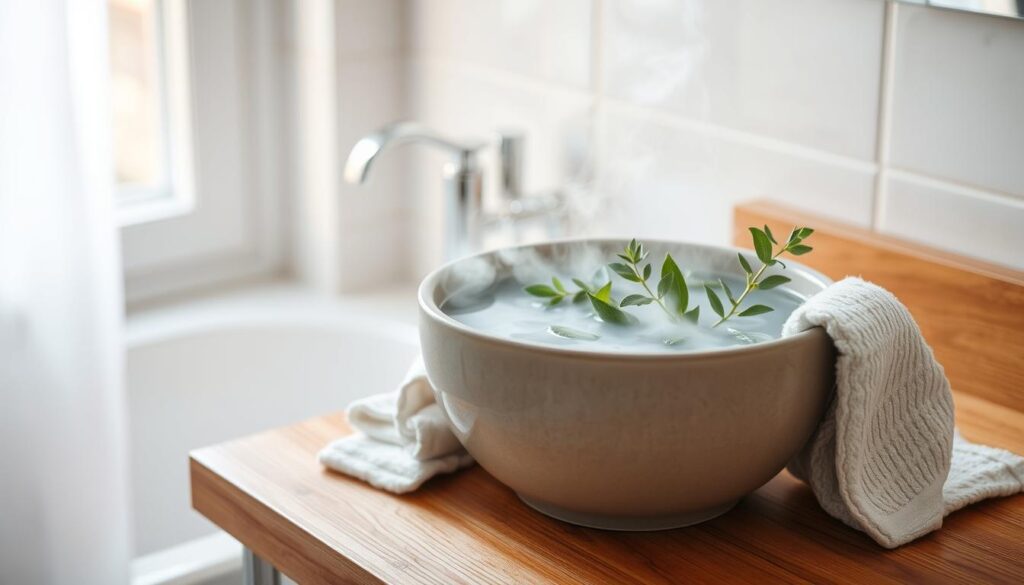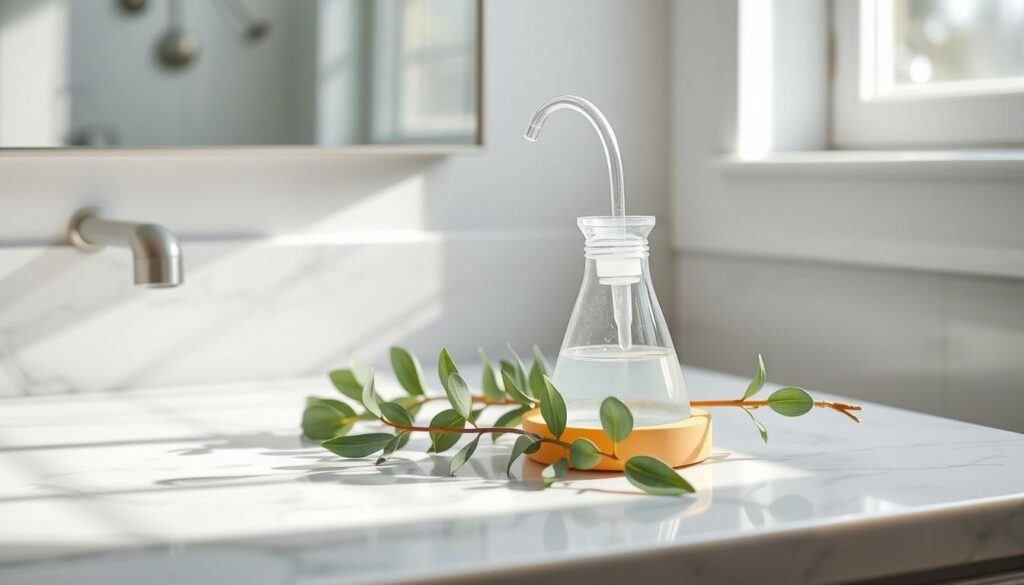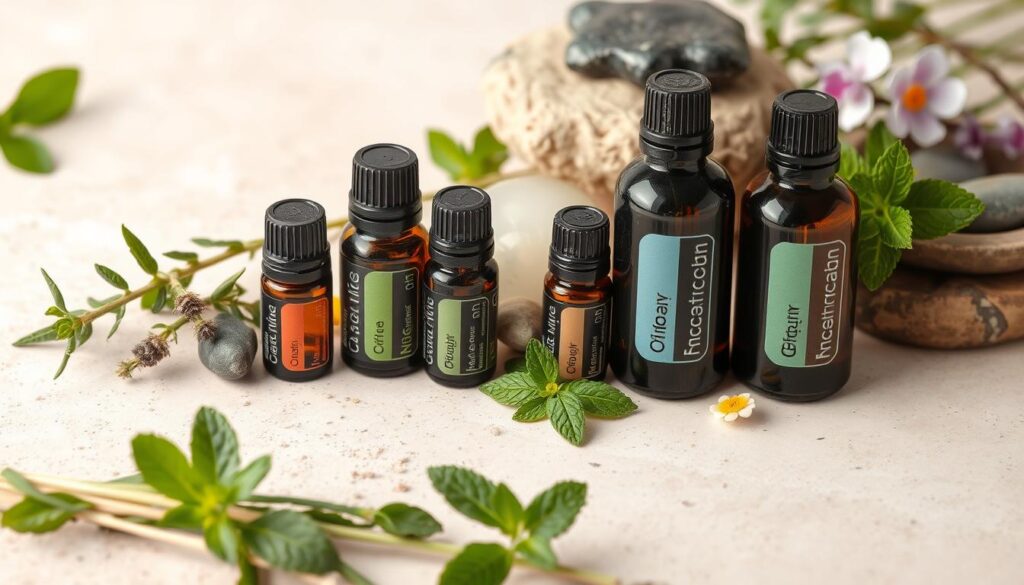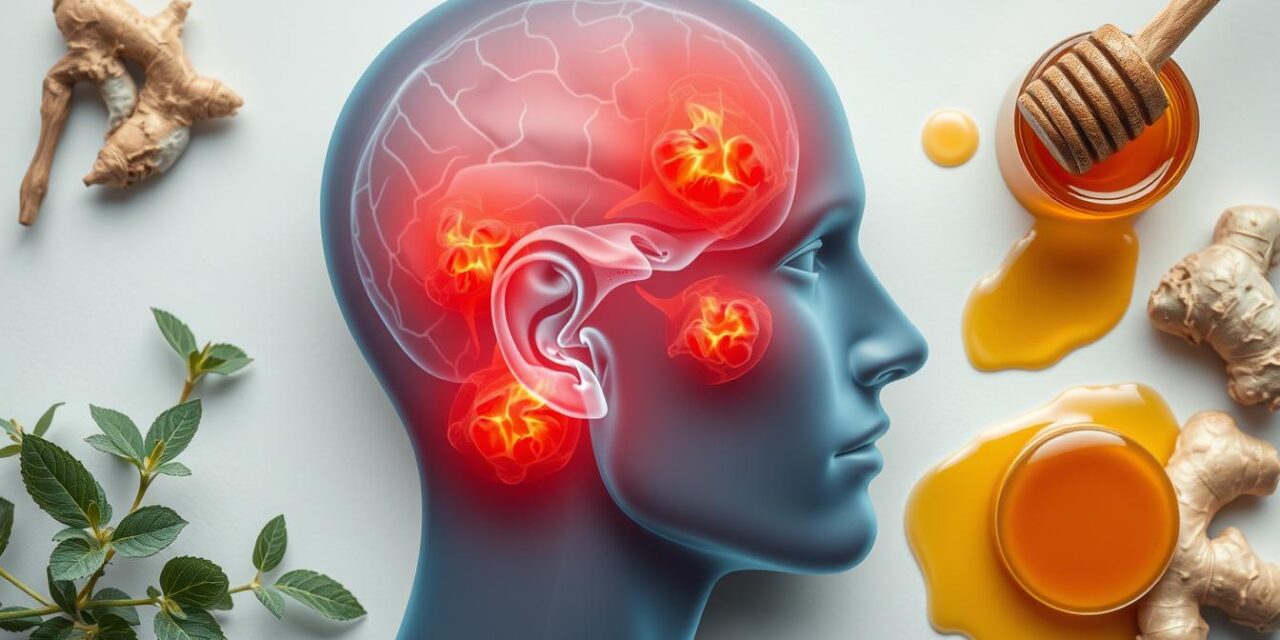Did you know over 31 million Australians deal with chronic sinus infections every year? This shows how common it is. But, there’s a silver lining – natural remedies can offer quick relief without harsh meds or surgery.
In this guide, we’ll look at effective natural solutions for sinus problems. You’ll learn about steam inhalation, herbal teas, and more. These natural methods can help ease sinus congestion and discomfort.
Key Takeaways
- Sinus infections are a widespread problem affecting millions of Australians each year.
- Natural remedies can provide fast and effective relief from sinus congestion and pressure.
- This guide will explore a variety of proven natural solutions for sinus health.
- Techniques like steam inhalation, saline solutions, and herbal teas can help clear sinus blockages.
- Incorporating essential oils, dietary modifications, and physical techniques can also contribute to sinus relief.
Understanding Sinus Infections and Their Symptoms
Sinus infections, also known as sinusitis, can be really frustrating. They happen when the sinuses get inflamed. This leads to a bunch of uncomfortable symptoms. Knowing the signs, types, and when to see a doctor is key to handling it well.
Common Signs of Sinusitis
The signs of a sinus infection include:
- Persistent nasal congestion or stuffiness
- Frequent sinus drainage or post-nasal drip
- Facial pain, pressure, or discomfort
- Headaches, especially in the forehead or around the eyes
- Reduced sense of smell or taste
- Cough or sore throat
Different Types of Sinus Infections
Sinus infections fall into two main categories:
- Acute sinusitis: This is a short-term infection lasting less than four weeks. It’s often caused by colds, flu, or allergies.
- Chronic sinusitis: This is when the inflammation lasts over 12 weeks. It can be due to ongoing health issues, structural problems, or frequent acute infections.
When to Seek Medical Attention
Many sinus infections can be treated at home. But, if symptoms don’t get better or get worse, you should see a doctor. Look out for:
- Severe or worsening headache
- Fever
- Symptoms that last longer than 10 days without improvement
- Recurring sinus infections (more than four per year)
- Extreme sinus pain treatment or discomfort
By knowing the signs and when to get help, you can better manage your sinus health. This helps find relief from sinus infection discomfort.
Essential Natural Ingredients for Sinus Relief
Looking for relief from sinus infections? Nature has some great solutions. Eucalyptus oil, ginger tea, and apple cider vinegar are all natural and effective. They offer a gentle way to ease sinus pain.
Eucalyptus oil is a natural decongestant. It helps clear your nasal passages and reduces sinus pressure. Its compounds, like 1,8-cineole, fight inflammation and bacteria. Just add a few drops to a diffuser or steam inhaler.
Ginger tea is known for soothing sinus symptoms. Ginger has compounds that thin mucus and reduce congestion. Drinking warm ginger tea can offer much-needed relief.
Apple cider vinegar is a versatile option for sinus health. Its acidity breaks down mucus, and its antibacterial and antiviral properties fight infection. Mix it with water and drink it as a tonic to help with sinus issues.
Using these natural ingredients can help manage your sinus symptoms. They are gentle yet effective. Always follow the right usage and talk to a doctor if your symptoms don’t improve.
“The power of nature lies in its ability to provide natural, holistic solutions for our everyday health concerns.”
Sinus Infection Home Remedy: Proven Methods
Natural home remedies can be very effective for sinus infections. Techniques like steam inhalation, making saline solutions, and drinking herbal teas are safe and holistic. They help manage symptoms of sinus infections.
Steam Inhalation Techniques
Steam inhalation is a classic remedy for sinus congestion. It thins mucus, reduces inflammation, and soothes the sinuses. To do it, fill a large bowl with hot water. Then, lean over the bowl and cover your head with a towel.
Make a steam tent. Breathe in the warm, moist air for 5-10 minutes. Do this a few times a day as needed.
Saline Solution Preparation
Flushing your nasal passages with a saltwater rinse can be a big help. Mix a teaspoon of salt in a cup of warm water. Use a neti pot or nasal irrigation system to rinse your sinuses.
This simple solution thins mucus, flushes out irritants, and promotes drainage.
Herbal Tea Combinations
Some herbal teas can be great for sinus infections. Try mixing ginger, turmeric, peppermint, and echinacea. These teas have anti-inflammatory and decongestant properties.

“Combining natural home remedies can be a highly effective way to manage sinus infections and find relief without relying solely on medication.”
Power of Nasal Irrigation for Sinus Health
For those with ongoing sinus problems, nasal irrigation is a powerful tool. Using a neti pot and saline rinses can offer great relief. It also helps keep your sinuses healthy in the long run.
Nasal irrigation has many benefits. It clears out mucus, reduces swelling, and helps sinuses drain. This not only eases the pain of sinus infections but also stops them from coming back.
- When using a neti pot, start by mixing a saline solution with warm, distilled water. Make sure it’s not too hot.
- Put the neti pot spout in one nostril and tilt your head to the other side. Let the solution flow through and out the other nostril.
- Do the same on the other side for a complete nasal irrigation session.
To get the best results, do this routine daily, ideally once or twice a day. Regular use of this natural method can greatly improve your sinus health and overall well-being.
| Nasal Irrigation Technique | Frequency of Use | Benefits |
|---|---|---|
| Neti Pot | Once or twice a day | Clears mucus, reduces inflammation, facilitates drainage |
| Saline Rinse | Once or twice a day | Flushes nasal passages, promotes sinus health |
Adding these nasal irrigation techniques to your daily routine can change your life. It tackles the main causes of sinus problems, leading to lasting relief and better breathing.

“Nasal irrigation has been a game-changer for me. It’s simple, natural, and has provided significant relief from my chronic sinus problems.”
Essential Oils and Aromatherapy Solutions
Essential oils can be a strong natural remedy for sinus infections. These plant extracts have many benefits, like clearing nasal congestion and reducing inflammation. They offer a way to ease sinusitis discomfort without harsh medicines.
Best Essential Oils for Sinusitis
The top essential oils for sinus relief are eucalyptus oil, peppermint oil, and tea tree oil. Eucalyptus oil helps open nasal passages and eases breathing. Peppermint oil can lessen sinus pressure and inflammation. Tea tree oil has antimicrobial properties to fight sinus infections.
Application Methods and Safety Tips
It’s key to use essential oils safely and correctly. Aromatherapy, like steam inhalation or diffusion, is a good way to enjoy their benefits. Always dilute the oils, as they can be strong and might irritate skin. Also, some oils can interact with medicines or health conditions, so talk to a doctor before using them.
Blending Recipes for Maximum Effect
- Combine eucalyptus oil, peppermint oil, and tea tree oil in a diffuser for a strong sinus-clearing mix.
- Mix eucalyptus oil and lavender oil with a carrier oil like coconut or almond oil. Apply it to the forehead, temples, and under the nose for a topical remedy.
- Create a steam inhalation blend by adding a few drops of eucalyptus oil and thyme oil to a bowl of hot water. Then, inhale the aromatic steam.
Essential oils and aromatherapy can offer natural relief for sinus infections. Always be careful and check with a healthcare professional before trying new remedies.

Dietary Modifications to Combat Sinus Infections
Diet plays a big role in managing sinus infections. By changing what we eat, we can help our sinuses feel better. This includes eating spicy foods and drinking lots of water.
Eating spicy foods is good for the sinuses. Foods like chilli peppers, ginger, and horseradish can help clear mucus. Spicy dishes add flavour and help clear nasal passages.
Drinking enough water is also key. It helps thin out mucus and gets rid of irritants. Staying hydrated can also ease sinus pressure and reduce swelling.
Adding anti-inflammatory foods to your diet can also help. Foods like salmon and walnuts are full of omega-3 fatty acids. They can reduce inflammation in the sinuses. Adding these foods to your diet can help with sinus relief.
| Dietary Changes for Sinus Health | Benefits |
|---|---|
| Spicy Foods (e.g., chilli peppers, ginger, horseradish) | Natural decongestant properties, thin mucus |
| Increased Hydration (e.g., water, herbal tea) | Thin mucus, flush out irritants, reduce inflammation |
| Anti-Inflammatory Foods (e.g., salmon, walnuts) | Reduce inflammation and swelling in the sinuses |
By making these dietary changes, Australians can manage their sinus infections better. A healthy diet is important for good sinus health.

Physical Techniques for Sinus Pressure Relief
If you’re dealing with sinus pressure and pain, try adding physical techniques to your routine. Gentle facial massages and acupressure points can help. These methods can ease sinus congestion and headaches without medication.
Facial Massage Methods
Massaging the face around the sinuses can help drain and ease tension. Start by pressing your fingertips on the nose bridge, then move to the cheekbones. Use circular motions on the eyes, temples, and forehead, but don’t press too hard. This can improve circulation and reduce pressure.
Acupressure Points for Sinuses
Acupressure points on the face and head can also offer sinus pressure relief. A key point is between the eyebrows, just above the nose. Use your index finger to apply gentle but firm pressure for 30 seconds to a minute. Another spot is between the thumb and index finger on the hand. Massaging this area can help with sinus headache symptoms.
Using warm compresses can also ease sinus discomfort. Just dampen a clean cloth with warm water and apply it to the affected areas. The heat can help loosen congestion.
Adding these physical therapies to your routine can help with sinus infections and pressure. Listen to your body and adjust the pressure and time as needed for the best results.
Environmental Factors and Prevention Strategies
Keeping your sinuses healthy is key to avoiding infections. Dry air can make your nasal passages sore and worsen sinus issues. Using a humidifier helps keep the air moist, which lowers the chance of getting a sinus infection.
Clean air is also vital for your sinuses. Pollutants, dust, and allergens can cause inflammation and lead to infections. Cleaning your home, using air purifiers, and avoiding irritants can help prevent sinus problems.
Natural decongestants, like essential oils and herbal remedies, are also helpful. They can clear your nasal passages, reduce swelling, and help your sinuses drain. This is better than using over-the-counter decongestants that can have side effects.
| Environmental Factor | Benefit for Sinus Health |
|---|---|
| Humidifier Use | Maintains moist nasal passages, reducing irritation and risk of sinus infections |
| Clean Air Quality | Minimizes exposure to pollutants, dust, and allergens that can trigger sinus problems |
| Natural Decongestants | Helps to clear nasal passages and promote sinus drainage without side effects |
By using these strategies every day, you can keep your sinuses healthy. This reduces the chance of getting sinus infections over and over again.
Creating a Daily Sinus Health Routine
Keeping your sinuses healthy is all about a balanced approach. Adding certain habits to your daily life can really help. Spend a few minutes each morning and night on activities that help your sinuses. This keeps your nasal passages open, stops infections, and boosts your breathing.
Morning Practices
Begin your day with a saline solution nasal rinse. It’s a simple yet powerful way to clear out mucus and ease swelling. Follow it up with steam inhalation to soften and clear your sinuses.
Adding a few drops of essential oils like eucalyptus or peppermint to your steam can be beneficial. These oils help open up your sinuses and reduce swelling. Also, gently rubbing your sinuses can help relieve pressure and improve blood flow.
Evening Rituals
- Try a calming herbal tea like ginger, turmeric, or chamomile in the evening. These herbs can help lessen sinus swelling and improve drainage.
- Do some gentle facial massage to ease tension around your sinuses and forehead.
- Use a nasal irrigation system before bed to clear out any leftover mucus. It helps your sinuses rest better at night.
By setting aside a few minutes each day for these easy, yet effective, sinus care steps, you can keep your sinuses healthy. This helps manage sinus drainage solutions and supports your overall nasal health.
Conclusion
By using natural remedies and making lifestyle changes, you can fight sinus congestion and infections. Steam inhalation, saline solutions, and essential oils are great options. They are safer than many medicines.
Knowing how to tackle sinus problems can help you breathe better and feel less pain. These natural sinus relief methods are easy to add to your daily life. They help you manage sinus issues in a natural way.
Keeping your sinuses healthy is a long-term effort. Using a mix of these natural methods can really help. Start using these tips today to improve your breathing and overall health.





